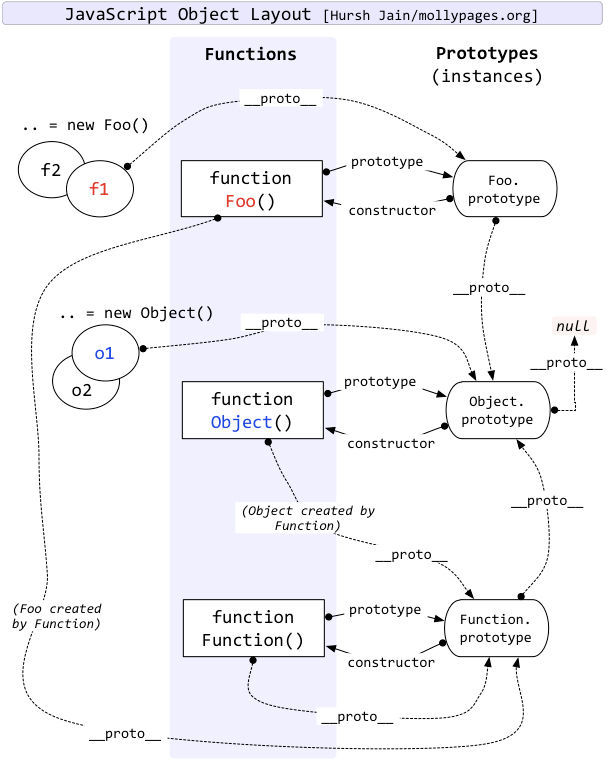JavaScript中的继承
开始之前
JavaScript使用场景- Web前端
- 服务器
- PC跨平台应用
- 移动端:
React NativeWeex微信小程序
Jeff Atwood: Any application that can be written in JavaScript, will eventually be written in JavaScript.
JavaScript的世界一切都是对象,函数也是对象!对象是一等公民!JavaScript是动态语言:可以方便的在运行时给对象添加或删除属性、方法
动态性比较:JavaScript > Objective-C > Java > Swit > C++
-
JavaScript多范式语言- 过程式
- 面向对象
- 函数式
- 响应式
- ....
-
JavaScript调试- 浏览器环境下运行:Chrome浏览器开发者工具
- Node环境运行:https://nodejs.org/zh-cn/
-
Hello world
var jsObject = {name:'Andrew'}
console.log(jsObject) //{name: "Andrew"}
console.log(jsObject.name) //Andrew
console.log(typeof jsObject) //object
console.log(jsObject.age) //undefined
jsObject.age = 30
console.log(jsObject.age) //30
function foo(){
return 'I am foo.'
}
jsObject.speak = foo
jsObject.speak() //"I am foo."
delete jsObject.speak
console.log(jsObject.speak) //undefined
console.log(typeof foo) //function
foo.customTag = 'HomeCredit';
console.log(foo.customTag) //HomeCredit
function foo2(){
return 2018
}
foo.customFunc = foo2
foo.customFunc() //2018
继承
JavaScript基于原型继承的语言:prototype(原型):只有函数对象拥有此字段,创建一个函数就有一个对应的函数原型对象,prototype指向函数原型对象__proto__(原型链):任何对象都拥有__proto__这个字段,用来在运行时查找调用的属性、方法,__proto__也指向某个对象,以此构成查找链。- 通过函数创建的对象的
__proto__字段,自动指向函数的原型对象
function Foo(){};
var foo = new Foo(); //只有函数才能使用new关键字
foo.__proto__ == Foo.prototype
tips:
JavaScript的世界一切都是对象
- 代码
function Base(){
}; //声明Base类,同时也是构造函数constructor,
console.log(Base) //ƒ Base(){}
console.log(Base.prototype)
/*
Base.prototype
constructor:ƒ Base()
__proto__:Object
*/
console.log(Base.__proto__) //ƒ () { [native code] }, Function.prototype
Base.__proto__ == Function.prototype //true
var base = new Base();
base.constructor //ƒ Base(){}
base.constructor == Base //true
base.__proto__ == Base.prototype //true
Object.prototype
/*
constructor:ƒ Object()
hasOwnProperty:ƒ hasOwnProperty()
isPrototypeOf:ƒ isPrototypeOf()
propertyIsEnumerable:ƒ propertyIsEnumerable()
toLocaleString:ƒ toLocaleString()
toString:ƒ toString()
valueOf:ƒ valueOf()
__defineGetter__:ƒ __defineGetter__()
__defineSetter__:ƒ __defineSetter__()
__lookupGetter__:ƒ __lookupGetter__()
__lookupSetter__:ƒ __lookupSetter__()
get __proto__:ƒ __proto__()
set __proto__:ƒ __proto__()
*/
Function.prototype // ƒ () { [native code] }
Object.__proto__ == Function.prototype //true
Function.prototype.__proto__ == Object.prototype //true
Base.__proto__ == Function.prototype //true
base.toString(); //"[object Object]"
Base.prototype = {
method1:function(){
return "Base method1";
},
method2:function(){
return "Base method2";
}
};
base.method1(); //undefined
base.method2(); //undefined
var base_new = new Base();
base_new.method1(); //"Base method1"
base_new.method2(); //"Base method2"
function Derived(){}
Derived.prototype = {
method1:function(){return "Derived method1";},
method3:function(){return "Derived method3";}
}
Derived.prototype.__proto__ = Base.prototype;
var derived = new Derived();
derived.method1(); //"Derived method1"
derived.method2(); //"Base method2"
derived.method3(); //"Derived method3"
class Base {
foo(){
return "i am base"
}
}
class Derived extends Base {
foo(){
return "i am Derived"
}
}
转码后
"use strict";
var _createClass = function () { function defineProperties(target, props) { for (var i = 0; i < props.length; i++) { var descriptor = props[i]; descriptor.enumerable = descriptor.enumerable || false; descriptor.configurable = true; if ("value" in descriptor) descriptor.writable = true; Object.defineProperty(target, descriptor.key, descriptor); } } return function (Constructor, protoProps, staticProps) { if (protoProps) defineProperties(Constructor.prototype, protoProps); if (staticProps) defineProperties(Constructor, staticProps); return Constructor; }; }();
function _possibleConstructorReturn(self, call) { if (!self) { throw new ReferenceError("this hasn't been initialised - super() hasn't been called"); } return call && (typeof call === "object" || typeof call === "function") ? call : self; }
function _inherits(subClass, superClass) { if (typeof superClass !== "function" && superClass !== null) { throw new TypeError("Super expression must either be null or a function, not " + typeof superClass); } subClass.prototype = Object.create(superClass && superClass.prototype, { constructor: { value: subClass, enumerable: false, writable: true, configurable: true } }); if (superClass) Object.setPrototypeOf ? Object.setPrototypeOf(subClass, superClass) : subClass.__proto__ = superClass; }
function _classCallCheck(instance, Constructor) { if (!(instance instanceof Constructor)) { throw new TypeError("Cannot call a class as a function"); } }
var Base = function () {
function Base() {
_classCallCheck(this, Base);
}
_createClass(Base, [{
key: "foo",
value: function foo() {
return "i am base";
}
}]);
return Base;
}();
var Derived = function (_Base) {
_inherits(Derived, _Base);
function Derived() {
_classCallCheck(this, Derived);
return _possibleConstructorReturn(this, (Derived.__proto__ || Object.getPrototypeOf(Derived)).apply(this, arguments));
}
_createClass(Derived, [{
key: "foo",
value: function foo() {
return "i am Derived";
}
}]);
return Derived;
}(Base);
